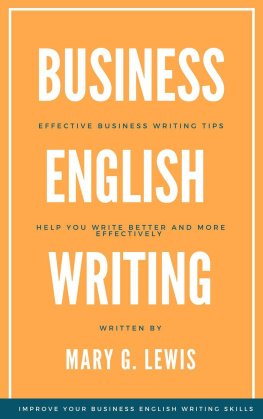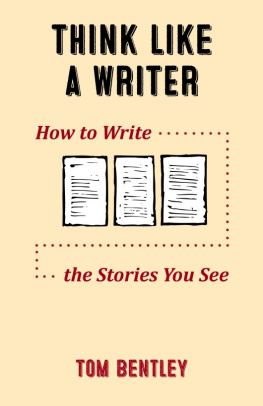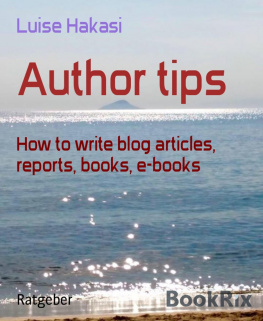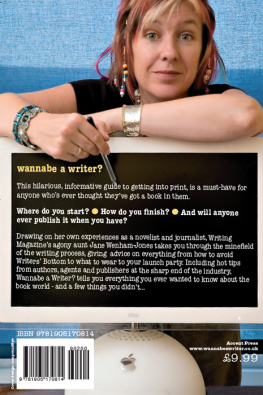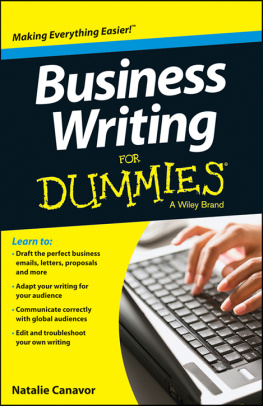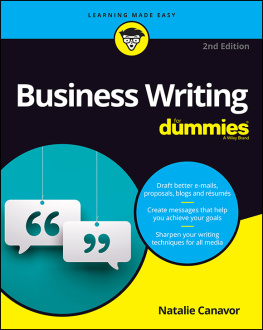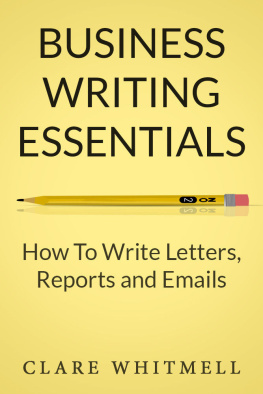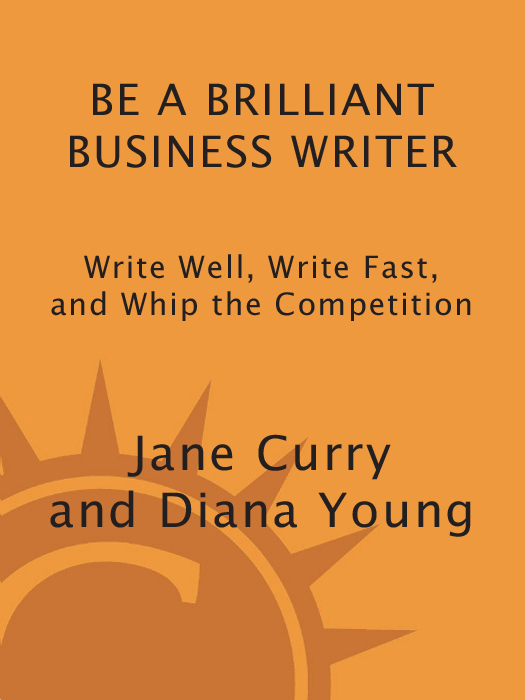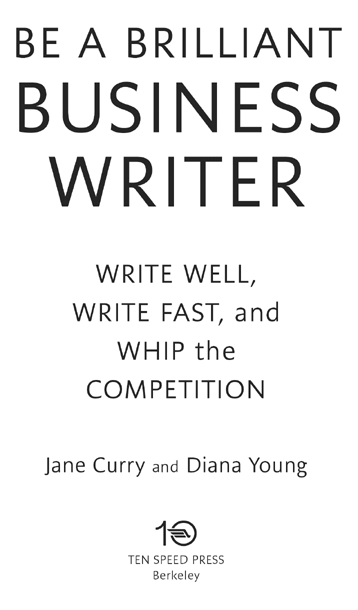Copyright 2010 by Jane Curry and Diana Young
All rights reserved.
Published in the United States by Celestial Arts, an imprint of the Crown Publishing Group, a division of Random House, Inc., New York.
www.crownpublishing.com
www.tenspeed.com
Ten Speed Press and the Ten Speed Press colophon are registered trademarks of Random House, Inc.
The slide on is used with permission of Michael Alley, The Craft of Scientific Presentations, 2nd ed. (New York: Springer-Verlag, 2010).
Library of Congress Cataloging-in-Publication Data
Curry, Jane (Jane Elizabeth), 1952
Be a brilliant business writer : write well, write fast, and whip the competition /
Jane Curry and Diana Young.
p. cm.
1. Business writing. I. Young, Diana, 1956- II. Title.
HF5718.3.C87 2010
651.74dc22
2010008876
eISBN: 978-1-58008-608-0
v3.1
To my favorite child:
you know who you are.
Contents
CHAPTER 1:
If you want to write persuasively
CHAPTER 2:
If you want readers to actually read and respond to what youve written
CHAPTER 3:
If you want to write clearly and concisely
CHAPTER 4:
If you want to write with the right tone
CHAPTER 5:
If you think you should write the way you talk
CHAPTER 6:
If you want to make your writing flow
CHAPTER 7:
If you want your business writing to be more creative
CHAPTER 8:
If you think you have to create a formal outline before you start writing
CHAPTER 9:
If you know what you want to say but arent sure where to start
CHAPTER 10:
If you need to write for senior management
CHAPTER 11:
If you need to share technical information
CHAPTER 12:
If you want to write procedures people can actually follow
CHAPTER 13:
If you dont want your email to land you in jail or lose you your job
CHAPTER 14:
If you need to convey bad news
CHAPTER 15:
If you want to write financial documents that work for senior management
CHAPTER 16:
If you want to write persuasive PowerPoint presentations
CHAPTER 17:
If you want to write executive summaries, sales letters, and email that increase your win ratio
CHAPTER 18:
If you want to send a thank-you or a follow-up note
CHAPTER 19:
If you want to write resumes and cover letters that will get you noticedin a good way
CHAPTER 20:
If you want to know when an email isnt the best political choice
CHAPTER 21:
If you want to make the leap from academic to business writing without self-destructing
CHAPTER 22:
If you want to make sure your writing is right
Introduction
If a man has nothing to say, he should refrain from giving evidence of that fact in writing.
GEORGE ELIOT
Succeeding in corporate America is challenging in the best of times, but when economic conditions are weak, demands increaseand fewer people are asked to do moreand in less time. In fact, many of you are so pressed for time you often have to slam away at your keyboards into the night, working against impossible and competing deadlines. No wonder most of you appear to need a good cry, a dry martini, and a long nap.
Like you, people who read business documents are crying, too, and wishing they could drink martinis and take naps, although not with you. Yet, corporate America almost fights against writing efficiency. Look around you: the landscape is littered with lost opportunities buried in the vast pit of empty words that is the final resting place of most business writing.
Its not that business people dont know that good writing is important or cant write; its that they dont know how to write what counts. So many words are spewed out in the course of every business day like so much toxic waste, and their pernicious effect limits what businesses can accomplish both by eliminating the potential for reflection and discussion and by delaying action.
This book is designed to help you write well, write fast, and whip the competition. This book is for you if you understand that writing is more than a soft skill that everyone already knows how to do. Embrace this book if you see writing as an economic engine that can help you:
- Increase profits
- Influence decisions
- Serve your professional reputation
- Support your firms strategic goals.
You already know how to write
Since you already know how to write, you dont need or have time to learn a whole new approach to writing: what you need are strategies that can help you leverage your skills so that you can write more effective documents in less timewithin the political context of corporate America. You need strategies that can help you elevate your voice above the corporate drone and help you achieve the business results you want.
Forget what you learned in school
If you want to increase your productivity, forget what you learned in school: forget outlining with Roman numerals, forget brainstorming, and stop obsessing about whether you need a comma before and in a series. Focus on what counts, on what will improve your readers understanding and prompt the outcomes you want.
Using this book, you can tap into strategies that will help you achieve the measurable economic benefits of effective writing: more business won, new efficiencies achieved, and more professional satisfaction and security.
Just turn to any page.
CHAPTER 1:
If you want to write persuasively
As you know, persuasive writing is not a soft skillit is economically and professionally central to your success in corporate America. Persuasive writing confers a competitive advantage and allows you to highlight your relevance, which in turn helps you keep your job, strengthen your relationships, and win more business.
If you want to write persuasively, forget about building to your conclusions and sounding like the genius you wish you were. Then, apply the following five principles:
- Organize so your key points are clear
- Include only relevant content
- Make sure readers actually read and respond to what youve written (see )
- Write clearly and concisely (see )
- Write with the right tone (see ).
1. Organize so your key points are clear
Organize your content so that your communications deliver the outcomes you want.
Make sure every opening sentence in every email and document passes the So what? test
You have no claim on your readers time, so if theres even a chance readers could respond to the opening sentence of your document or email by saying So what? or by asking And how is this relevant or important to me? you need to revise the opening so they know exactly why they should keep reading.
Here are a few typical irritatingly useless opening sentences from email; all fail the So what? test, and work better than Ambien or narcolepsy at putting readers to sleep.
Opening sentences that fail the So what? test
My name is John Grant, and I work in the marketing department at Branding, Inc.
I have attached a summary of the analysis we conducted last week of the Gigabyte Gateway.
Over the past few months the procurement department has been evaluating its vendor relationships as well as the expectations associated with those relationships.


